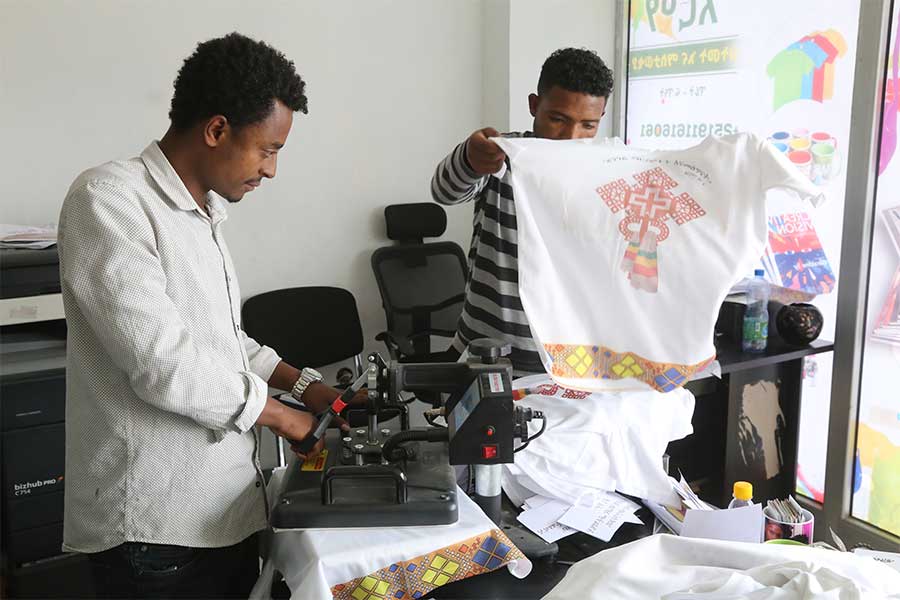
Fortune News | Jan 13,2024
Oct 12 , 2024
By Kidist Yidnekachew
I witnessed a wave of frustration from my friend when her older brother refused to let her wear his shirt. Her reaction came in the context of a close bond they have nurtured—particularly after he took on a parental role following the loss of their parents. Although his reliability as a brother affirms their connection, this seemingly minor refusal overshadowed it for her.
It was not the first time. In the past, she would wear his shirts without asking, but he has since emphasised that his belongings now hold deeper meaning for him. For her, however, the shirt represented more than an item—it was a sign of what she felt was a diminished role she had in his life.
This prompted me to reflect on the nature of sharing. The way we share—whether it is possessions, time, or emotions—speaks volumes about our connections. Her disappointment was not just about the shirt; it reflected a deeper desire for closeness and understanding in their relationship.
It is not uncommon for close relationships to quarrel when it comes to sharing personal items. Many people attach symbolic meaning to their belongings. For some, clothes may serve as an extension of identity, reflecting personal tastes and values. Sharing such items feels like exposing a part of oneself, leading to vulnerability and discomfort.
For those who have experienced loss, betrayal, or scarcity, sharing can become emotionally charged. Past experiences may heighten concerns that cherished items could be misused or treated carelessly, turning what might seem like a trivial decision into a deeply emotional one.
In some cases, sharing stirs feelings tied to power dynamics. Possessing a rare or cherished item evokes a sense of exclusivity. Sharing it may diminish that value or leave the owner feeling vulnerable. This dynamic is particularly pronounced in relationships where there is an imbalance of authority, as sharing threatens the dominance of the more powerful partner.
Fairness and reciprocity also play a role. People sometimes hesitate to share if they believe they would not receive the same treatment in return. When this sense of imbalance grows, it leads to resentment, creating distance and making future acts of generosity less likely.
For some, the attachment to personal items begins in childhood. Those who experienced loss or scarcity early in life may form strong emotional bonds with their possessions, viewing them as sources of comfort and security. For these individuals, sharing can feel like a threat to their sense of safety.
Resolving conflicts like these, especially when they touch on deeper emotional connections, requires open communication and empathy from both sides. Boundaries could help but it is also worth acknowledging that people value their belongings differently. Ultimately, relationships are built on more than shared possessions. Both could benefit from seeing that closeness is not defined by how freely they lend things but by how they show up for each other in meaningful ways.
While the exact reason may be unclear in this case, I reassured my friend that her brother’s decision likely had little to do with his feelings for her. Sometimes, choices around sharing are driven by deeper psychological factors that are not immediately obvious. Understanding these layers may help people communicate more effectively and resolve conflicts over sharing.
PUBLISHED ON
Oct 12,2024 [ VOL
25 , NO
1276]


Fortune News | Jan 13,2024

Radar | Apr 08,2023

Featured | Jan 18,2020

My Opinion | Aug 16,2025

Photo Gallery | 179298 Views | May 06,2019

Photo Gallery | 169495 Views | Apr 26,2019

Photo Gallery | 160403 Views | Oct 06,2021

My Opinion | 137165 Views | Aug 14,2021
Commentaries | Oct 25,2025

Dec 22 , 2024 . By TIZITA SHEWAFERAW
Charged with transforming colossal state-owned enterprises into modern and competitiv...

Aug 18 , 2024 . By AKSAH ITALO
Although predictable Yonas Zerihun's job in the ride-hailing service is not immune to...

Jul 28 , 2024 . By TIZITA SHEWAFERAW
Unhabitual, perhaps too many, Samuel Gebreyohannes, 38, used to occasionally enjoy a couple of beers at breakfast. However, he recently swit...

Jul 13 , 2024 . By AKSAH ITALO
Investors who rely on tractors, trucks, and field vehicles for commuting, transporting commodities, and f...

Oct 25 , 2025
The regulatory machinery is on overdrive. In only two years, no fewer than 35 new pro...

Oct 18 , 2025
The political establishment, notably the ruling party and its top brass, has become p...

Oct 11 , 2025
Ladislas Farago, a roving Associated Press (AP) correspondent, arrived in Ethiopia in...

Oct 4 , 2025
Eyob Tekalegn (PhD) had been in the Governor's chair for only weeks when, on Septembe...

Oct 25 , 2025 . By YITBAREK GETACHEW
Officials of the Addis Abeba's Education Bureau have embarked on an ambitious experim...

Oct 26 , 2025 . By YITBAREK GETACHEW
The federal government is making a landmark shift in its investment incentive regime...

Oct 29 , 2025 . By NAHOM AYELE
The National Bank of Ethiopia (NBE) is preparing to issue a directive that will funda...

Oct 26 , 2025 . By SURAFEL MULUGETA
A community of booksellers shadowing the Ethiopian National Theatre has been jolted b...